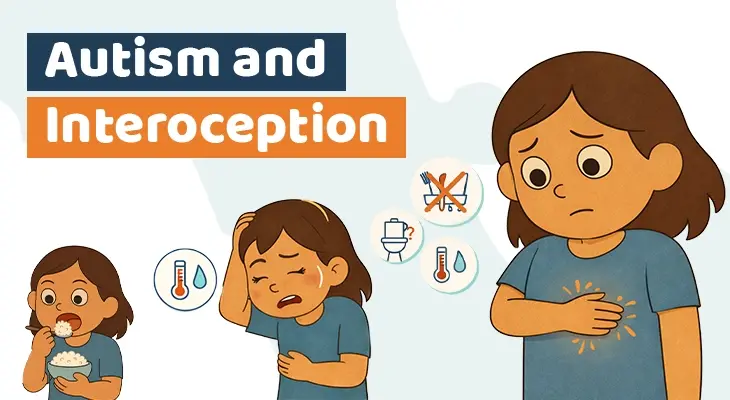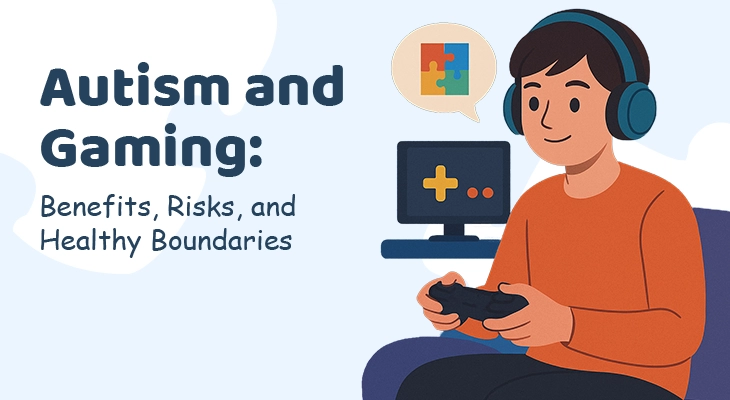Introduction
The exact causes of autism spectrum disorder (ASD) remain unknown. However, diagnoses have risen significantly, from an estimated 1 in 10,000 children in 1970 to 1 in 36 today. This dramatic increase begs the question: is autism truly becoming more prevalent, or are we simply getting better at identifying it? While the reasons for this rise are under active investigation, it’s important to focus on what we do know about the causes of ASD.
This blog post will delve into the current understanding of what causes autism spectrum disorder. We’ll explore the potential causes and examine promising areas of research.
Table of Contents
- Family History And Autism
- Genetic Mutations And Autism
- Heritability And Autism
- Parental Age And Autism
- Premature Birth and Low Birth Weight And Autism
- Pollution and Toxins And Autism
- Energy Metabolism Factors And Autism
- Brain Structure And Function And Autism
- Neurotransmitter Imbalances And Autism
- Maternal Immune Activation And Autism
- Inflammation And Autism
- Essential Nutrients And Autism
- The Gut-Brain Connection And Autism
- Folate: A Common Thread?
- Did You Know?
- Conclusion
- References
Research strongly suggests a significant genetic component. Here’s a closer look at how genes might play a role.
Family History And Autism
Having a close relative with autism significantly increases a child’s risk of developing the condition. For instance, if a parent or sibling has autism, the risk for a child is roughly 18%, compared to the general population risk of around 1 in 36.
Genetic Mutations And Autism
Scientists have identified specific gene mutations that can increase the risk of autism. These mutations can occur in various genes, including SHANK3, CHD8, and SCN2A. While these mutations don’t guarantee autism, they can influence brain development in ways that may contribute to autistic traits.
Heritability And Autism
Studies provide strong evidence for the genetic link. Heritability estimates, which measure the influence of genes on a trait, suggest that 50% to 90% of the risk for autism can be attributed to genetics. This doesn’t mean there’s a single “autism gene,” but rather a complex interplay of multiple genes that can interact with environmental factors to influence an individual’s susceptibility.
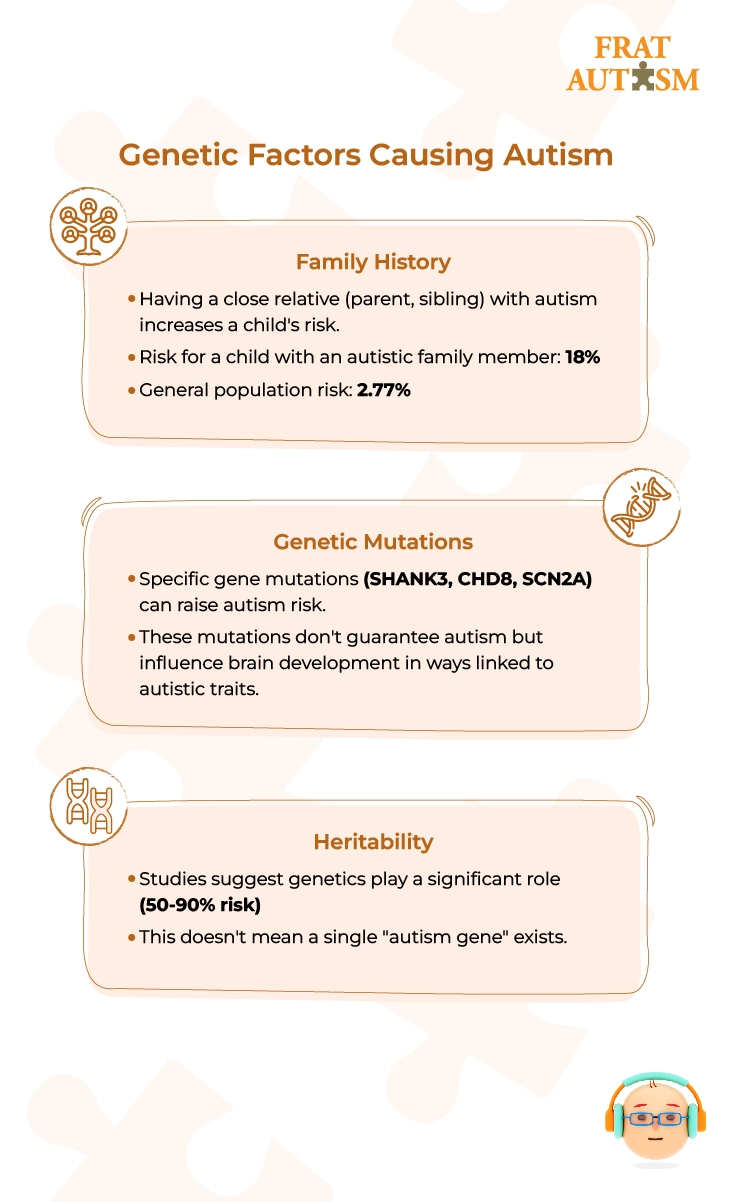
Download Download & share this infograph card in your network [Free Download]
While genetics play a significant role in autism spectrum disorder (ASD), the environment also appears to be a contributing factor. Here’s a look at some potential environmental influences.
Prenatal Environment
Certain factors during pregnancy can elevate a child’s risk of autism. These include:
- Maternal Infections: Certain infections during pregnancy may increase the risk.
- Chemical Exposures: Exposure to certain medications, pesticides, or heavy metals may be a potential factor, though more research is needed.
- Pregnancy Complications: Complications during delivery can also be associated with an increased risk.
Parental Age And Autism
Advanced parental age, particularly in fathers, has been linked to a slightly higher risk of autism in offspring. The reasons behind this association are still being investigated.
Premature Birth And Low Birth Weight, And Autism
Some Babies born prematurely or with low birth weight may be more likely to develop autism. This may be due to factors related to the baby’s brain development during a critical stage.
Pollution And Toxins, And Autism
Exposure to environmental pollutants like air pollution or Bisphenol A (BPA) might be a potential risk factor. However, research in this area is ongoing and the exact link remains unclear.
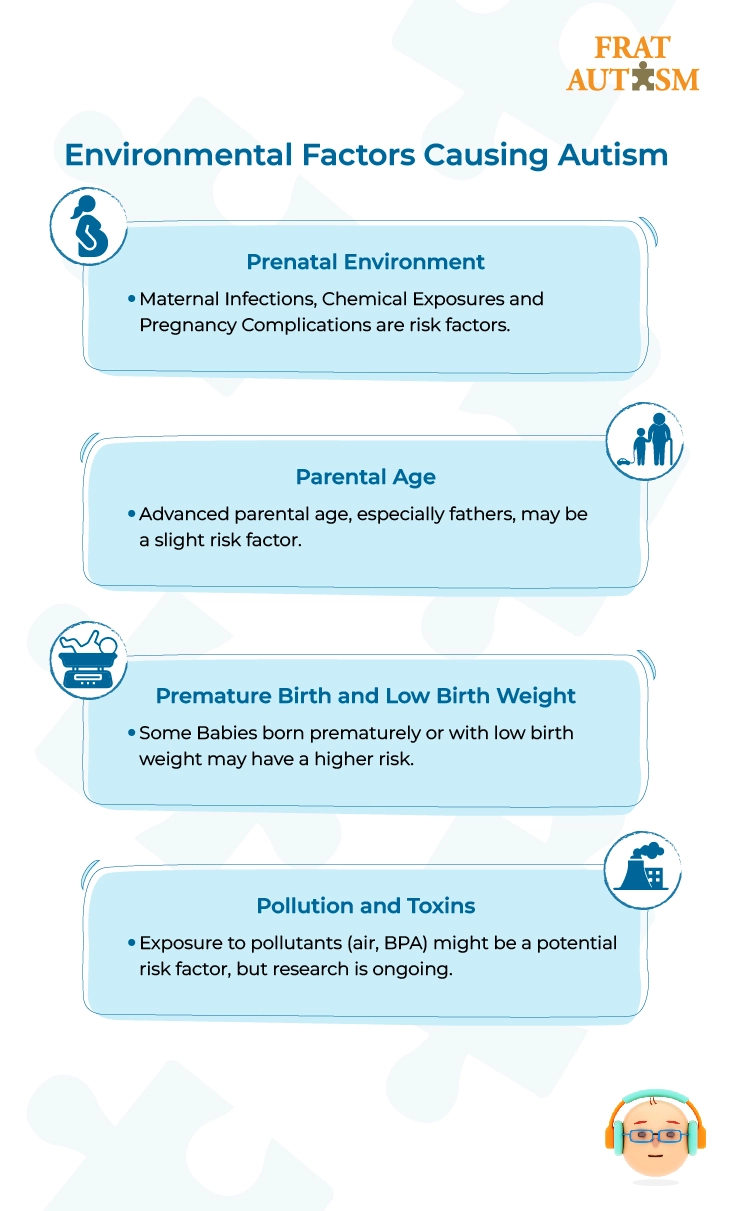
Download Download & share this infograph card in your network [Free Download]
Energy Metabolism Factors And Autism
Imagine tiny factories inside your cells, constantly working to generate energy. These factories are called mitochondria, and they’re crucial for every cell’s function. They convert nutrients from food into a usable form of energy called ATP, which fuels all cellular processes.
Some research suggests that mitochondrial dysfunction, or impaired mitochondrial function, might play a role in some cases of autism. This means the mitochondria may not be producing energy as efficiently as they should. This potential energy shortage could disrupt critical brain processes related to communication, social interaction, and behavior regulation, which are core challenges in ASD.
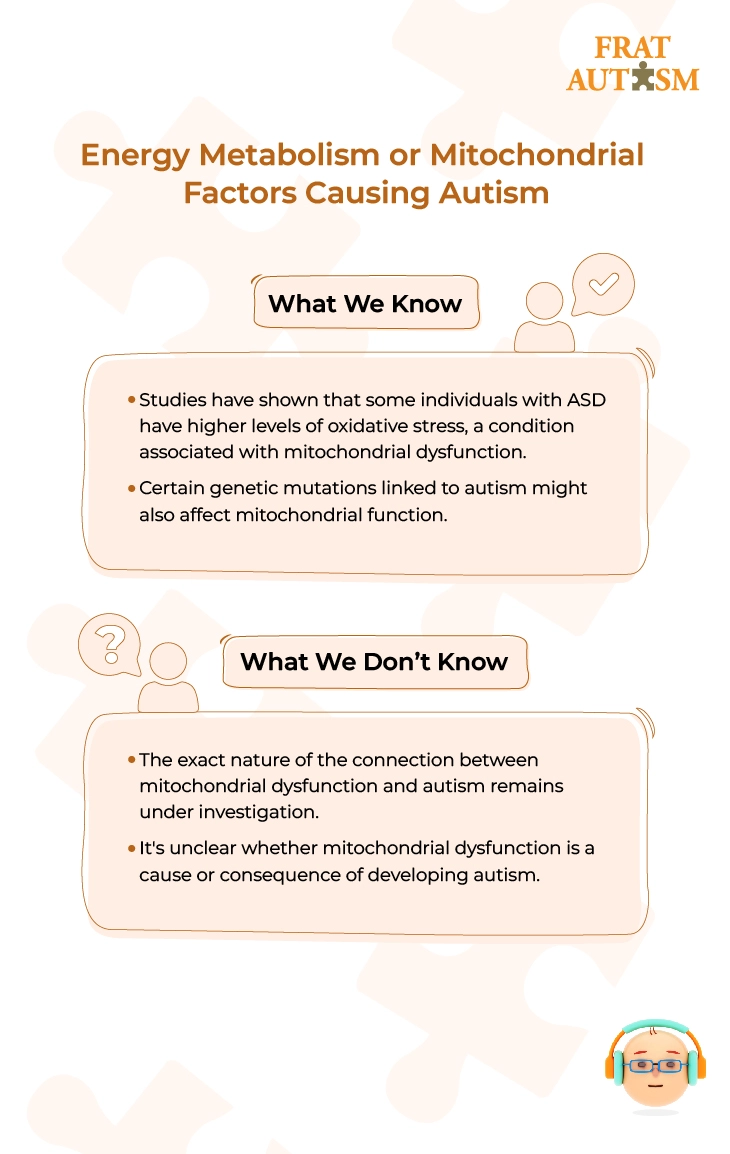
Download Download & share this infograph card in your network [Free Download]
The complex neurological landscape of the brain plays a significant role in autism spectrum disorder (ASD). Here, we’ll explore two key areas of neurological influence:
Brain Structure And Function, And Autism
Brain imaging studies have revealed that some individuals with ASD may have differences in brain size, structure, and connectivity compared to neurotypical individuals. These differences can involve specific brain regions like the cerebellum, amygdala, and prefrontal cortex, which are crucial for social interaction, communication, and emotional processing.
Neurotransmitter Imbalances And Autism
Neurotransmitters are chemical messengers that play a vital role in brain communication. Research suggests that imbalances in certain neurotransmitters, such as serotonin and dopamine, might contribute to some of the core challenges in ASD.
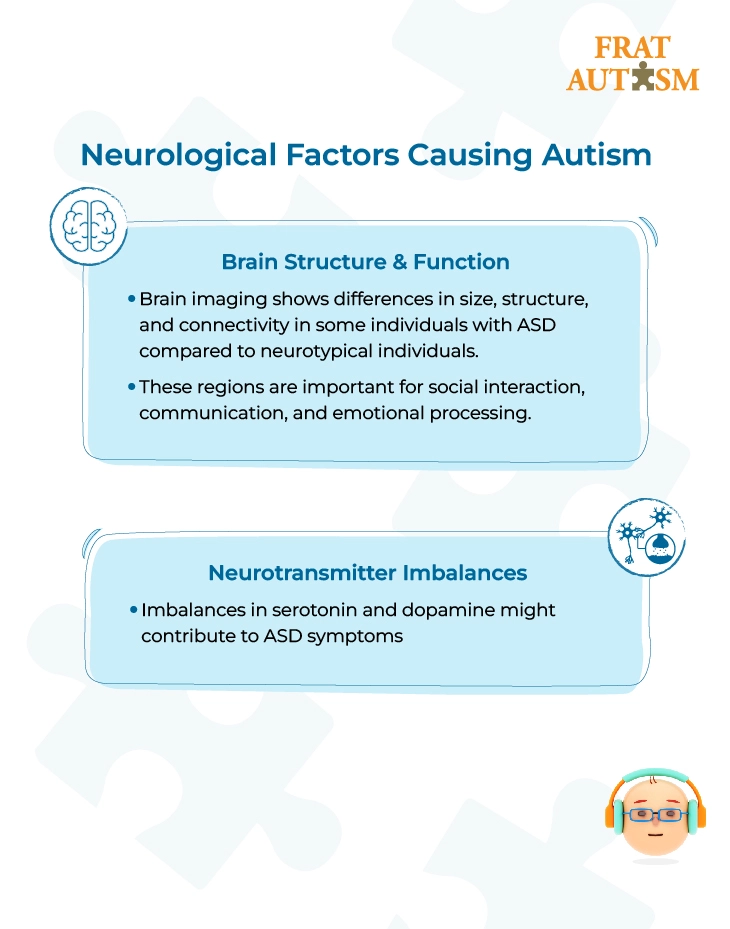
Download Download & share this infograph card in your network [Free Download]
The complex interplay between the immune system and the developing brain is being explored as a potential factor in autism spectrum disorder (ASD). Here, we’ll delve into two areas of immunological influence:
Maternal Immune Activation And Autism
Research suggests that abnormal immune responses in the mother during pregnancy, triggered by infections or autoimmune conditions, might increase the risk of autism in offspring. This is thought to be because by activated immune cells that release inflammatory molecules which cross the placenta and potentially disrupt fetal brain development.
Inflammation And Autism
Studies have found elevated levels of inflammatory markers in the blood and brain tissue of some individuals with ASD. This suggests that chronic, low-grade inflammation might be present in the brains of some people with autism. It’s unclear whether inflammation is a cause or consequence of autism development.
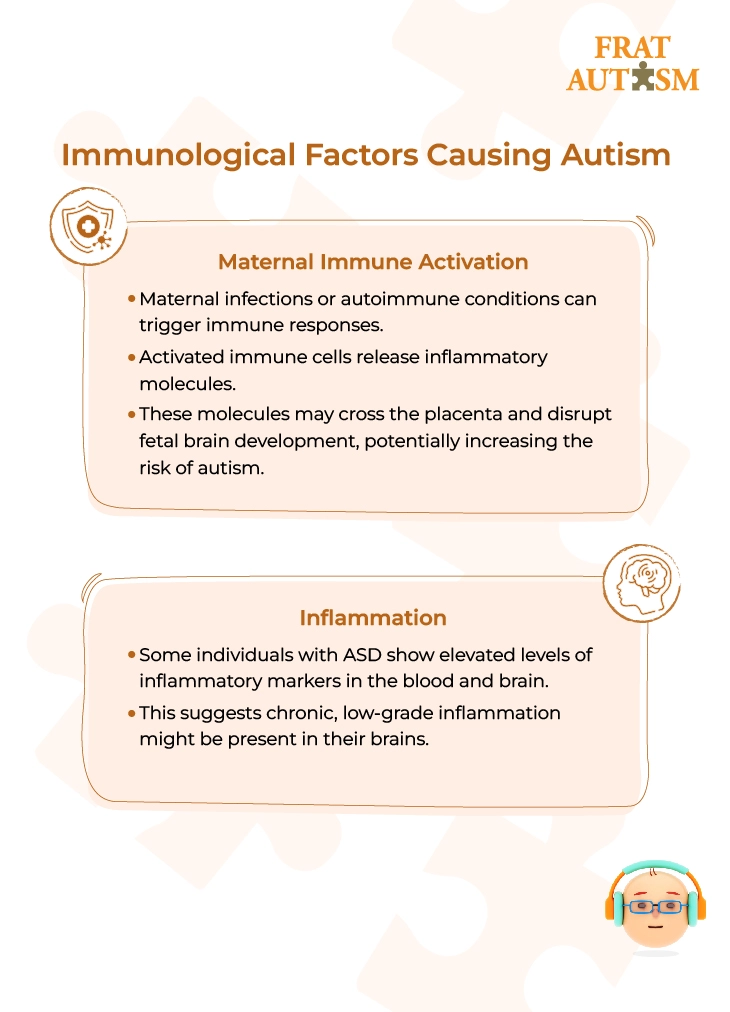
Download Download & share this infograph card in your network [Free Download]
While not a direct cause of autism, proper nutrition plays a crucial role in brain health and development. Here’s a look at how nutritional factors might influence autism spectrum disorder (ASD):
Essential Nutrients And Autism
Deficiencies in vitamins and minerals like folate (vitamin B9), vitamin D, and omega-3 fatty acids might be linked to some autism symptoms. These nutrients are essential for brain development, neurotransmitter function, and overall cognitive processes. Deficiencies can potentially affect attention, mood, and brain health, which can overlap with some challenges faced by individuals with ASD.
The Gut-Brain Connection And Autism
Emerging research is exploring the connection between the gut microbiome (gut bacteria) and brain health, often referred to as the “gut-brain axis.” Studies have observed differences in gut microbiota composition in some individuals with ASD compared to neurotypical individuals. The exact implications of these differences are still being investigated, but they might influence brain development and function in ways relevant to autism.
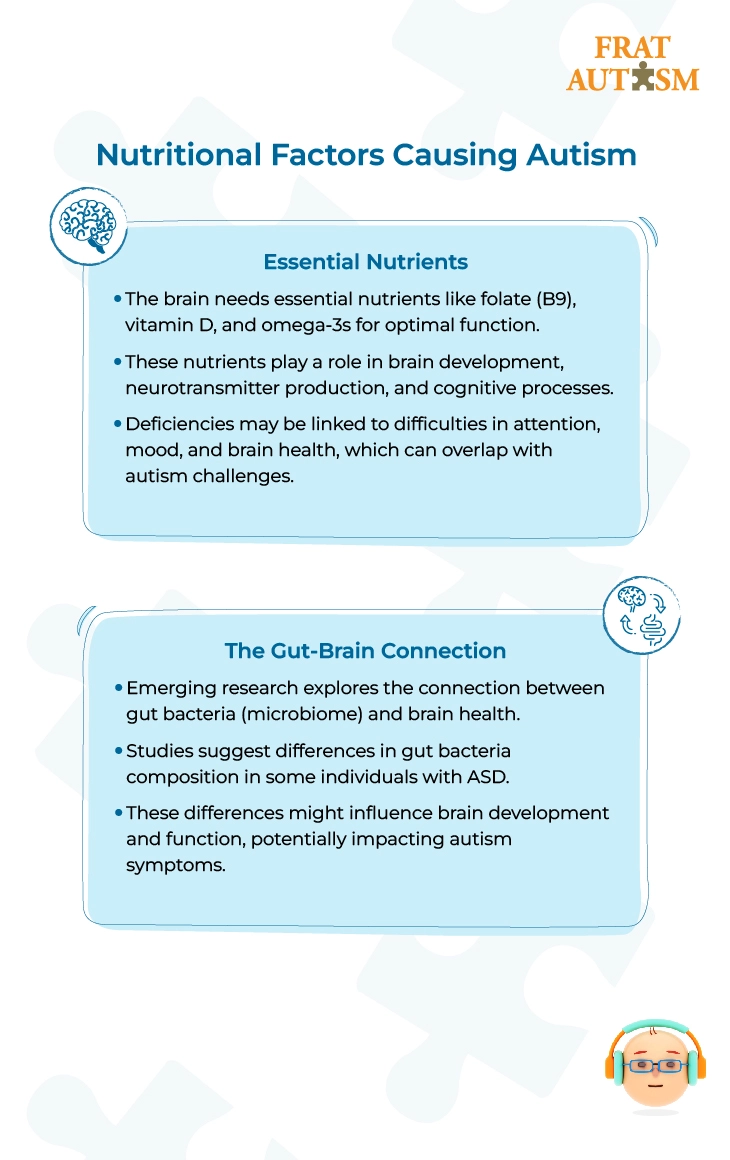
Download Download & share this infograph card in your network [Free Download]
Folate: A Common Thread?
Of all these factors, there is one very interesting component, which is not well recognized but has an important influence in each, and that is folate, more widely recognized as Vitamin B9.
Folate's Widespread Role
Folate is a crucial B vitamin that plays a vital role in various bodily functions, including cell division, DNA synthesis, and amino acid metabolism. In the context of brain health, folate is essential for the production of neurotransmitters and the proper development of the neural tube, which forms the early structure of the brain and spinal cord.
Potential Benefits for Autism
Research suggests that adequate folate intake during pregnancy might be particularly important for reducing the risk of autism in offspring. Additionally, some studies have explored the potential benefits of folate supplementation in improving symptoms like social interaction and communication in individuals with ASD.
What Is The Most Common Reason For Cerebral Folate Deficiency?
The presence of Folate Receptor Autoantibodies (FRAs) is a significant risk factor for cerebral folate deficiency. If you have a child with autism, it may be beneficial to discuss FRA testing with your child’s healthcare provider.
Conclusion
While there’s no single cause of autism, understanding these potential influences empowers us to explore preventative measures, support strategies, and potentially, personalized treatment approaches. By working together, researchers, healthcare professionals, families, and the autism community can continue to unlock the mysteries of this condition and create a world where everyone can thrive.
References
- Molecular Psychiatry, Mitochondrial dysfunction in autism spectrum disorders: a systematic review and meta-analysis
- Springer Link, Clinical and Molecular Characteristics of Mitochondrial Dysfunction in Autism Spectrum Disorder
- Above & Beyond Therapy, How Does Autism Affect the Brain?
- Translational Psychiatry, Maternal immune conditions are increased in males with autism spectrum disorders and are associated with behavioral and emotional but not cognitive comorbidity
- Autism, National Institute of Environmental Health Science, NIH



